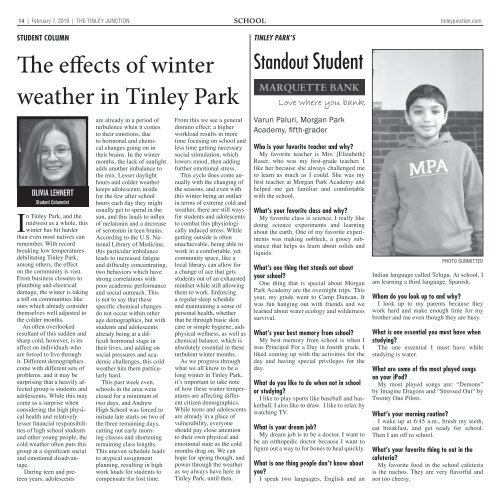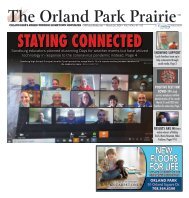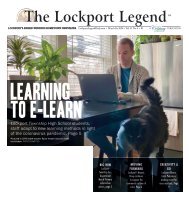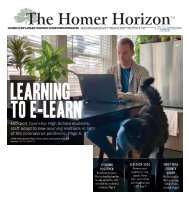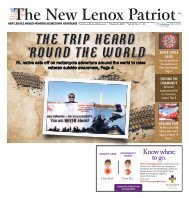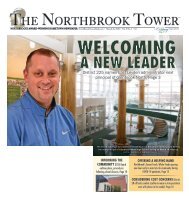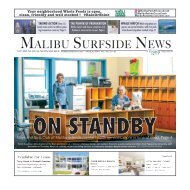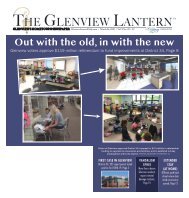TP_020719
Create successful ePaper yourself
Turn your PDF publications into a flip-book with our unique Google optimized e-Paper software.
14 | February 7, 2019 | The tinley junction school<br />
tinleyjunction.com<br />
Student Column<br />
The effects of winter<br />
weather in Tinley Park<br />
Olivia Lehnert<br />
Student Columnist<br />
In Tinley Park, and the<br />
midwest as a whole, this<br />
winter has hit harder<br />
than even most natives can<br />
remember. With record<br />
breaking low temperatures<br />
debilitating Tinley Park,<br />
among others, the effect<br />
on the community is vast.<br />
From business closures to<br />
plumbing and electrical<br />
damage, the winter is taking<br />
a toll on communities like<br />
ours which already consider<br />
themselves well adjusted to<br />
the colder months.<br />
An often overlooked<br />
resultant of this sudden and<br />
sharp cold, however, is its<br />
affect on individuals who<br />
are forced to live through<br />
it. Different demographics<br />
come with different sets of<br />
problems, and it may be<br />
surprising that a heavily affected<br />
group is students and<br />
adolescents. While this may<br />
come as a surprise when<br />
considering the high physical<br />
health and relatively<br />
lesser financial responsibilities<br />
of high school students<br />
and other young people, the<br />
cold weather often puts this<br />
group at a significant social<br />
and emotional disadvantage.<br />
During teen and preteen<br />
years, adolescents<br />
are already in a period of<br />
turbulence when it comes<br />
to their emotions, due<br />
to hormonal and chemical<br />
changes going on in<br />
their brains. In the winter<br />
months, the lack of sunlight<br />
adds another imbalance to<br />
the mix. Lesser daylight<br />
hours and colder weather<br />
keeps adolescents inside<br />
for the few after school<br />
hours each day they might<br />
usually get to spend in the<br />
sun, and this leads to influx<br />
of melatonin and a decrease<br />
of serotonin in teen brains.<br />
According to the U.S. National<br />
Library of Medicine,<br />
this particular imbalance<br />
leads to increased fatigue<br />
and difficulty concentrating,<br />
two behaviors which have<br />
strong correlations with<br />
poor academic performance<br />
and social outreach. This<br />
is not to say that these<br />
specific chemical changes<br />
do not occur within other<br />
age demographics, but with<br />
students and adolescents<br />
already being at a difficult<br />
hormonal stage in<br />
their lives, and adding on<br />
social pressures and academic<br />
challenges, this cold<br />
weather hits them particularly<br />
hard.<br />
This past week even,<br />
schools in the area were<br />
closed for a minimum of<br />
two days, and Andrew<br />
High School was forced to<br />
initiate late starts on two of<br />
the three remaining days,<br />
cutting out early morning<br />
classes and shortening<br />
remaining class lengths.<br />
This uneven schedule leads<br />
to atypical assignment<br />
planning, resulting in high<br />
work loads for students to<br />
compensate for lost time.<br />
From this we see a general<br />
domino effect: a higher<br />
workload results in more<br />
time focusing on school and<br />
less time getting necessary<br />
social stimulation, which<br />
lowers mood, then adding<br />
further emotional stress.<br />
This cycle does come annually<br />
with the changing of<br />
the seasons, and even with<br />
this winter being an outlier<br />
in terms of extreme cold and<br />
weather, there are still ways<br />
for students and adolescents<br />
to combat this physiologically<br />
induced stress. While<br />
getting outside is often<br />
unachievable, being able to<br />
work in a comfortable, yet<br />
community space, like a<br />
local library, can allow for<br />
a change of ace that gets<br />
students out of an exhausted<br />
mindset while still allowing<br />
them to work. Enforcing<br />
a regular sleep schedule<br />
and maintaining a sense of<br />
personal health, whether<br />
that be through basic skin<br />
care or simple hygiene, aids<br />
physical wellness, as well as<br />
chemical balance, which is<br />
absolutely essential in these<br />
turbulent winter months.<br />
As we progress through<br />
what we all know to be a<br />
long winter in Tinley Park,<br />
it’s important to take note<br />
of how these winter temperatures<br />
are affecting different<br />
citizen demographics.<br />
While teens and adolescents<br />
are already in a place of<br />
vulnerability, everyone<br />
should pay close attention<br />
to their own physical and<br />
emotional state as the cold<br />
months drag on. We can<br />
hope for spring though, and<br />
power through the weather<br />
as we always have here in<br />
Tinley Park, until then.<br />
Tinley park’s<br />
Standout Student<br />
Varun Paluri, Morgan Park<br />
Academy, fifth-grader<br />
Who is your favorite teacher and why?<br />
My favorite teacher is Mrs. [Elizabeth]<br />
Raser, who was my first-grade teacher. I<br />
like her because she always challenged me<br />
to learn as much as I could. She was my<br />
first teacher at Morgan Park Academy and<br />
helped me get familiar and comfortable<br />
with the school.<br />
What’s your favorite class and why?<br />
My favorite class is science. I really like<br />
doing science experiments and learning<br />
about the earth. One of my favorite experiments<br />
was making oobleck, a gooey substance<br />
that helps us learn about solids and<br />
liquids.<br />
What’s one thing that stands out about<br />
your school?<br />
One thing that is special about Morgan<br />
Park Academy are the overnight trips. This<br />
year, my grade went to Camp Duncan. It<br />
was fun hanging out with friends and we<br />
learned about water ecology and wilderness<br />
survival.<br />
What’s your best memory from school?<br />
My best memory from school is when I<br />
was Principal For a Day in fourth grade. I<br />
liked coming up with the activities for the<br />
day and having special privileges for the<br />
day.<br />
What do you like to do when not in school<br />
or studying?<br />
I like to play sports like baseball and basketball.<br />
I also like to draw. I like to relax by<br />
watching TV.<br />
What is your dream job?<br />
My dream job is to be a doctor. I want to<br />
be an orthopedic doctor because I want to<br />
figure out a way to for bones to heal quickly.<br />
What is one thing people don’t know about<br />
you?<br />
I speak two languages, English and an<br />
photo submitted<br />
Indian language called Telugu. At school, I<br />
am learning a third language, Spanish.<br />
Whom do you look up to and why?<br />
I look up to my parents because they<br />
work hard and make enough time for my<br />
brother and me even though they are busy.<br />
What is one essential you must have when<br />
studying?<br />
The one essential I must have while<br />
studying is water.<br />
What are some of the most played songs<br />
on your iPod?<br />
My most played songs are: “Demons”<br />
by Imagine Dragons and “Stressed Out” by<br />
Twenty One Pilots.<br />
What’s your morning routine?<br />
I wake up at 6:45 a.m., brush my teeth,<br />
eat breakfast, and get ready for school.<br />
Then I am off to school.<br />
What’s your favorite thing to eat in the<br />
cafeteria?<br />
My favorite food in the school cafeteria<br />
is the nachos. They are very flavorful and<br />
not too cheesy.


